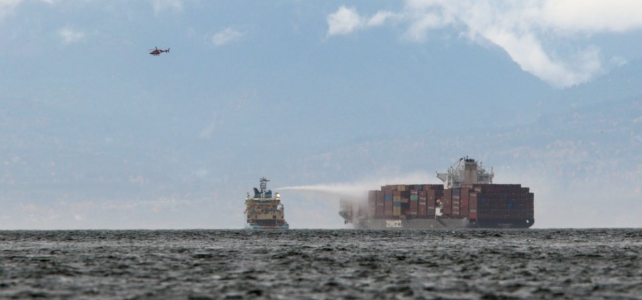The container ship rolled and lost 109 containers overboard, spilling cargo along Vancouver Island’s beaches. About 36 hours later, while the vessel was anchored off Victoria, a fire broke on the ship.
||| FROM THE TIMES COLONIST |||
Canada needs to act promptly to require emergency-response plans for vessels, says the Transportation Safety Board, in the wake of an investigation into a container ship that rolled and lost more than 100 containers off the Island’s west coast three years ago.
After losing cargo about 50 kilometres south of Ucluelet, the Zim Kingston made its way to Constance Bay off Victoria, where a fire broke out in a container that contained potassium amyl xanthate, then spread to other cargo, burning for five days.
The Zim Kingston incident is just the latest maritime emergency highlighting the “ever-present risk to people, property and the environment” such incidents pose, Kathy Fox told a news conference in Vancouver on Wednesday.
“It’s not a matter of if but when a similar incident will occur.
“And the question is: Will Canada be prepared for it?”
Transport Canada is in the midst of developing regulations to strengthen preparedness requirements for the industry — including requiring vessels to have arrangements for firefighting and salvage services, and creating a specialist position who could work with the federal departments and others to manage an incident — but they are not expected to be in place until 2028.
“We know from past experience that developing regulations could take substantially longer than anticipated but there’s no need for that,” Fox said.
“It’s a matter of priorities and surely it can be done much quicker.”
The board also cited the need for comprehensive guidance to manage the risk of dangerous “parametric” rolling, which was experienced by the Zim Kingston, which tipped 36 degrees.
The risk of this type of rolling could have been identified by using guidance materials that are available to industry but were not on board the Zim Kingston, Fox said.
The Zim Kingston left South Korea on Oct. 6, 2021 loaded with nearly 2,000 containers carrying both dangerous goods and consumer products, and bound for the Deltaport container terminal in Delta.
It arrived three days later, but the master was told there were no anchorages available.
He decided to hold the vessel offshore, outside Juan de Fuca Strait. But when a storm rolled in, the Zim Kingston rolled from side-to-side four times, sending 109 containers, or 11 per cent of the vessel’s deck cargo, overboard, said Etienne Seguin-Bertrand, senior investigator with the Transportation Safety Board.
That kind of rolling happens when sea conditions, such as wave height, length and direction, combine with other factors specific to a vessel, such as stability and speed.
“When those factors interact in a precise way, sudden dangerous rolling motions are generated,” he said.
The TSB report says there needs to be a focus on monitoring for the conditions that give rise to the rolling so preventive measures can be taken.
**If you are reading theOrcasonian for free, thank your fellow islanders. If you would like to support theOrcasonian CLICK HERE to set your modestly-priced, voluntary subscription. Otherwise, no worries; we’re happy to share with you.**









In this harrowing incident, which I wrote about in the Seattle Times, the Salish Sea dodged a serious bullet. Luckily, there just happened to be two Maersk fire-fighting vessels anchored in Victoria harbor that promptly extinguished the Zim Kingston fire. Otherwise, it probably would have gone to the bottom of the Strait of Juan de Fuca with all the remaining containers, containing dangerous chemicals and leaking diesel fuel.
This worrisome incident highlights what Canada SHOULD be doing but IS NOT doing, given all the additional seagoing vessels being attracted into Salish Sea waters by virtue of its Transmountain Pipeline Expansion Project and the proposed expansion of its Roberts Bank container terminal. At the very least, there should be an additional rescue tug stationed in Sydney, BC. And how about a fire-fighting vessel regularly stationed there or in Victoria?
Something for the San Juan County Commissioners to think about and act on. Jamie Stephens did so previously.
Well said, Michael. Many thanks for providing “the Rest of the Story”! Staying tuned!!